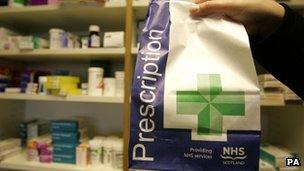Scots GPs 'could save NHS £26m'
- Published

Spending on prescription medicines has fallen despite a rise in the number being handed out
GPs could save Scotland's NHS £26m a year without affecting patient care, the country's spending watchdog has said.
Audit Scotland said the savings could be made by reducing waste and cutting the use of less suitable medicines.
But it found the health service had made major improvements to how it manages general practice prescriptions.
Spending on drugs has fallen in real terms over the past seven years despite a rise in the number of prescriptions.
Audit Scotland said GP prescriptions cost the NHS almost £1bn a year, and accounted for 70% of all NHS spending on drugs in Scotland
Its Prescribing in General Practice in Scotland report said family doctors were getting more support and guidance on their prescribing.
Spending fell by 11% in real terms between 2004 and 2011, despite the volume of prescriptions rising by a third during that time.
On average, a GP practice in Scotland hands out 70 prescriptions a day, while more than 900,000 people over the age of 50 are taking four drugs or more.
Auditor General for Scotland, Caroline Gardner, said: "Most people in Scotland get a prescription from their family doctor at some point to treat or prevent an illness or help sustain a good quality of life.
"The NHS spends almost £1bn a year on drugs prescribed in general practice. Since we last looked at GP prescribing, the volume of drugs prescribed has continued to rise but the NHS has significantly improved how it manages spending. This was during a period when there have been considerable pressures and constraints on the health service.
"It has achieved this through providing doctors with more support and guidance and using better information about what GPs are prescribing. Demand for prescriptions is likely to increase further and it's important that the NHS continues to work with GPs to make sure patients get the drugs they need and spending is well managed."
The report also said the health service now has better quality information on GPs' prescribing than in the past.
It said NHS boards should target areas for further improvement, such as identifying where particular drugs are over or under-prescribed and supporting GPs to review patients who take a number of different medicines.
Audit Scotland said a number of factors would affect prescribing and its associated spending in coming years, and it is difficult to forecast and quantify their long-term impact.
Cheaper versions
These factors include new medicines and cheaper versions of existing drugs becoming available, Scotland's ageing population, and lifestyle issues such as obesity, smoking and alcohol misuse and associated illnesses.
The unclear long-term picture means it is important the NHS continues supporting cost-effective prescribing to get the most from the significant investment, it added.
The report found it was too early to tell whether the abolition of prescription charges in Scotland had an impact on prescribing. Charges were phased out in Scotland from April 2008 and abolished completely in April 2011.
In 2011/12 there were 91 million prescriptions issued by about 1,000 GP practices in Scotland, costing £974m.
Welcoming the report, Dr Alan McDevitt, chairman of the BMA's Scottish General Practitioners Committee, said: "Prescribing costs in the NHS are second only to workforce costs in the health budget and therefore opportunities to make savings here can have a significant impact on health spending.
"However, when considering prescribing of medicine by GPs it is important to look at the wider impact on the NHS, rather than simply seeking to reduce the number of prescriptions issued.
"The Quality Framework of the GP contract and the introduction of clinical guidelines for GPs have led to improved management of patients, often with the support of prescribed medicines. And better management of patients with high blood pressure or diabetes, for example, can be effective in reducing hospital admissions.
"Therefore investing in good prescribing in general practice can deliver savings in other parts of the health service."
Scottish Conservative health spokesman Jackson Carlaw said: "Less than half of this money earmarked for potential savings could be used for the creation of a Cancer Drugs Fund, similar to the one in operation in England."